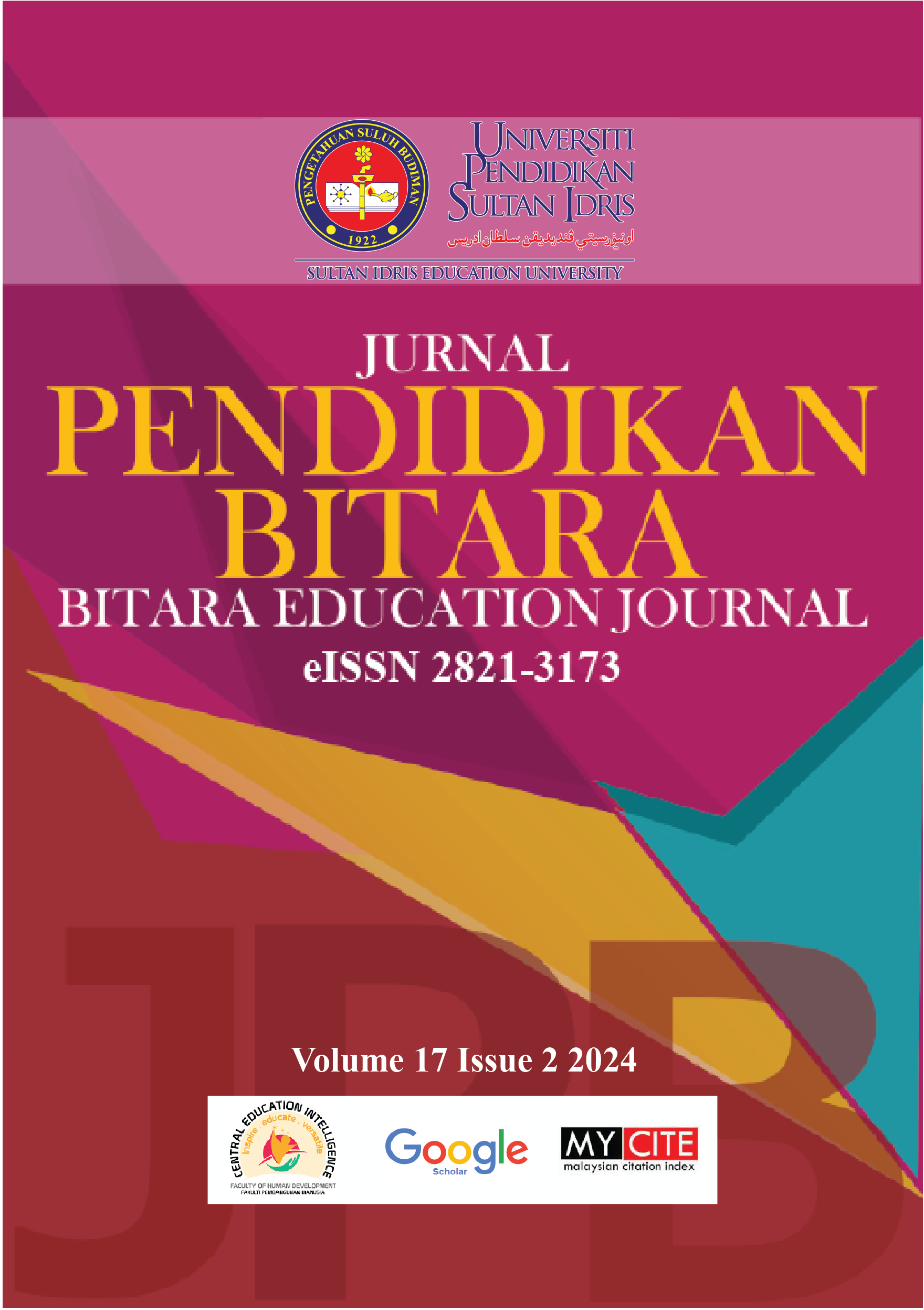Persepsi Pelajar Pra-Universiti dalam Menggunakan AI Generatif: Kajian di Universiti Swasta Malaysia
DOI:
https://doi.org/10.37134/bitara.vol17.2.12.2024Keywords:
kecerdasan buatan generatif, model penerimaan teknologi, persepsi pengguna, pra-universiti, pendidikan tinggiAbstract
Kajian ini bertujuan untuk memahami persepsi pelajar dalam menggunakan kecerdasan buatan atau artificial intelligence (AI) generatif dalam kalangan pelajar pra-universiti. Satu soal selidik telah diedarkan kepada 153 orang responden dan SPSS digunakan untuk menganalisis data. Model Penerimaan Teknologi (TAM) dirujuk sebagai rangka kerja utama untuk kajian. Dapatan kajian menunjukkan bahawa persepsi pelajar pra-universiti terhadap teknologi AI generatif dipengaruhi oleh faedah dan cabaran dalam menggunakan teknologi tersebut. Berdasarkan dapatan kajian juga dicadangkan bahawa lebih banyak kajian perlu dilakukan untuk menyiasat persepsi terhadap penggunaan AI generatif dalam bidang pendidikan. Penyelidikan lanjut diperlukan untuk memberikan pandangan untuk penyelidikan masa depan dan pembangunan dasar pendidikan mengenai penggunaan AI generatif. Secara keseluruhan, kertas kerja ini berfungsi sebagai asas untuk kajian dan strategi masa depan dalam menggunakan AI generatif melalui integrasi dalam pengajaran dan pembelajaran di peringkat universiti di Malaysia.
Downloads
References
Agbaglo, E., & Bonsu, E. M. (2022). The role of digital technologies in higher education during the Coronavirus pandemic: Insights from a Ghanaian university. Social Education Research, 45–57. https://doi.org/10.37256/ser.3320221402
Akmese, O. F., Kor, H., & Erbay, H. (2021). Use of Machine Learning Techniques for the Forecast of Student Achievement in Higher Education. Information Technologies and Learning Tools, 82(2), 297–311. https://doi.org/10.33407/ITLT.V82I2.4178
Araujo, T., Helberger, N., Kruikemeier, S., & de Vreese, C. H. (2020). In AI we trust? Perceptions about automated decision-making by artificial intelligence. AI and Society, 35(3), 611–623. https://doi.org/10.1007/s00146-019-00931-w
Ausat, A. M. A., Massang, B., Efendi, M., Nofirman, N., & Riady, Y. (2023). Can Chat GPT replace the role of the teacher in the classroom: A fundamental analysis. Journal on Education, 5(4), 16100–16106. https://doi.org/10.31004/JOE.V5I4.2745
Azam Che Bakri. (2023, March 5). Incorporate AI into education system. The Sun, 9. Bonsu, E. M., & Baffour-Koduah, D. (2023). From the Consumers’ Side: Determining
Students’ Perception and Intention to Use ChatGPT in Ghanaian Higher Education. Journal of Education, Society & Multiculturalism, 4(1), 1–29. https://doi.org/10.2478/jesm-2023-0001
Chen, K., Shao, A., Burapacheep, J., & Li, Y. (2022). How GPT-3 responds to different publics on climate change and Black Lives Matter: A critical appraisal of equity in conversational AI.
Davis, F. D. (1989). Perceived Usefulness, Perceived Ease of Use, and User Acceptance of Information Technology. MIS Quarterly, 13(3), 319. https://doi.org/10.2307/249008
Elbanna, S., & Armstrong, L. (2023). Exploring the integration of ChatGPT in education: adapting for the future. Management & Sustainability: An Arab Review, ahead-of- print(ahead-of-print). https://doi.org/10.1108/MSAR-03-2023-0016
Elkhodr, M., Gide, E., Wu, R., Darwish, O., Elkhodr, M., Gide, E., Wu, R., & Darwish, O. (2023). ICT students’ perceptions towards ChatGPT: An experimental reflective lab analysis. STEM Education 2023 2:70, 3(2), 70–88. https://doi.org/10.3934/STEME.2023006
Floridi, L., & Chiriatti, M. (2020). GPT-3: Its Nature, Scope, Limits, and Consequences. Minds and Machines, 30, 681–694. https://doi.org/10.1007/s11023-020-09548-1
Haglund, J. H. (2023). Students acceptance and use of ChatGPT in academic settings. Uppsala University.
Lieberman, M. (2023, January 4). What is ChatGPT and how is it used in education? EducationWeek. https://www.edweek.org/technology/what-is-chatgpt-and-how-is-it- used-in-education/2023/01
Liu, B. (2023). Chinese university students’ attitudes and perceptions in learning English using ChatGPT. International Journal of Education and Humanities (IJEH), 3(2), 132–140. http://i-jeh.com/index.php/ijeh/index
Mohamed, A. M. (2024). Exploring the potential of an AI-based Chatbot (ChatGPT) in enhancing English as a Foreign Language (EFL) teaching: perceptions of EFL Faculty Members. Education and Information Technologies, 29, 3195–3217. https://doi.org/10.1007/s10639-023-11917-z
Mollick, E. R., & Mollick, L. (2022). New Modes of Learning Enabled by AI Chatbots: Three Methods and Assignments. SSRN Electronic Journal. https://doi.org/10.2139/ssrn.4300783
Ngo, T. T. A. (2023). The Perception by University Students of the Use of ChatGPT in Education. International Journal of Emerging Technologies in Learning (IJET), 18(17), 4–19. https://doi.org/10.3991/ijet.v18i17.39019
Organisation for Economic Co-operation and Development. (2023). Generative AI in the classroom: From hype to reality?
Scherer, R., Siddiq, F., & Tondeur, J. (2019). The technology acceptance model (TAM): A meta-analytic structural equation modeling approach to explaining teachers’ adoption of digital technology in education. Computers & Education, 128, 13–35. https://doi.org/10.1016/j.compedu.2018.09.009
Shoufan, A. (2023). Exploring Students’ Perceptions of ChatGPT: Thematic Analysis and Follow-Up Survey. IEEE Access, 11, 38805–38818. https://doi.org/10.1109/ACCESS.2023.3268224
Thormundsson, B. (2024, February 13). Artificial intelligence (AI) worldwide - statistics & facts. Statista. https://www.statista.com/topics/3104/artificial-intelligence-ai- worldwide/#topicOverview
Tlili, A., Shehata, B., Adarkwah, M. A., Bozkurt, A., Hickey, D. T., Huang, R., & Agyemang, B. (2023). What if the devil is my guardian angel: ChatGPT as a case study of using chatbots in education. Smart Learning Environments, 10(1). https://doi.org/10.1186/s40561-023-00237-x
Venkatesh, V., Smith, R. H., Morris, M. G., Davis, G. B., Davis, F. D., & Walton, S. M. (2003). USER ACCEPTANCE OF INFORMATION TECHNOLOGY: TOWARD A UNIFIED VIEW 1. In User Acceptance of IT MIS Quarterly (Vol. 27, Issue 3).
von Kameke, L. (2023, May 10). Top user concerns about ChatGPT SEA 2023. Statista. Xie, X. (2023). Influence of AI-driven Inquiry Teaching on Learning Outcomes.
International Journal of Emerging Technologies in Learning (IJET), 18(23), 59–70. https://doi.org/10.3991/ijet.v18i23.45473
Yeh, S. C., Wu, A. W., Yu, H. C., Wu, H. C., Kuo, Y. P., & Chen, P. X. (2021). Public perception of artificial intelligence and its connections to the sustainable development goals. Sustainability (Switzerland), 13(16). https://doi.org/10.3390/su13169165
Yilmaz, H., Maxutov, S., Baitekov, A., & Balta, N. (2023). Student Attitudes towards Chat GPT: A Technology Acceptance Model Survey. International Educational Review, 1(1), 57–83. https://doi.org/10.58693/ier.114
Zhai, X. (2023). ChatGPT User Experience: Implications for Education. SSRN Electronic Journal. https://doi.org/10.2139/ssrn.4312418
Downloads
Published
Issue
Section
License
Copyright (c) 2024 Nelfi Adiela Mizan, Helmi Norman

This work is licensed under a Creative Commons Attribution-NonCommercial-ShareAlike 4.0 International License.





